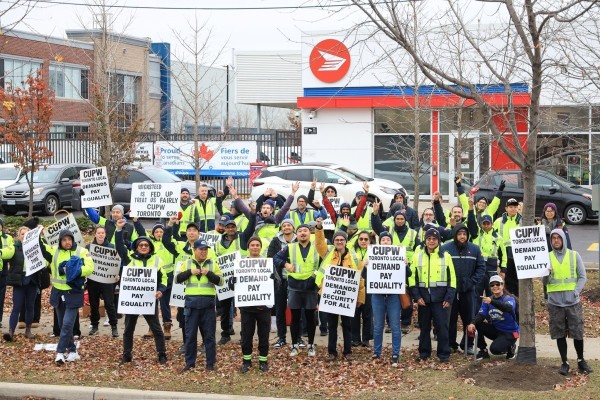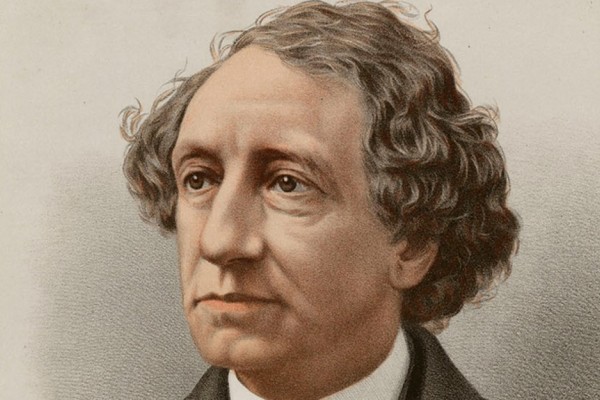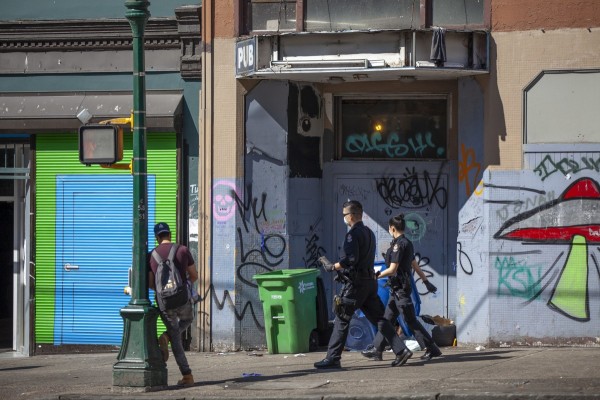The attack on democratic rights
Clarke: The right to dissent, to go on strike and to resist injustices must be defended vigorously and exercised relentlessly

Activists with Just Stop Oil during a November 2022 protest near Trafalgar Square. Photo by Alisdare Hickson/Flickr.
In his inauguration speech, Donald Trump proclaimed, “I was saved by God to make America great again”—leaving no doubt that we can expect scant regard for the democratic rights of those who oppose his Divine Mission. Indeed, writing in The Conversation, French scholar Jérôme Viala-Gaudefroy describes Trump’s rhetoric as marked by “triumphalism and overt authoritarianism.”
Pierre Poilievre, who may well be the next Canadian prime minister, personifies the same impatience with opposition, as he advances his radical right-wing agenda. As I noted in my last column for Canadian Dimension, he regards his opponents as a sinister force, as he lashes out at “authoritarian socialism” and characterizes challenges to the inequities in society as intolerable expressions of “wokeism.” Clearly, the need to defend democratic rights is pressing on both sides of the border.
Flawed democracy
If we are to defend democratic rights, we must distinguish between the rights that were won in struggle and the flawed systems of political representation that exist in liberal democracies like Canada. As the historical record shows, these systems were developed to provide representation only to men of property.
Elections Canada acknowledges that the electoral system at the time of Canadian Confederation in 1867 granted the right to vote to property-owning males exclusively. It wasn’t until 1918 that voting rights were extended to women; and racially-based restrictions persisted for decades after this. Shockingly, the removal of all voting restrictions on Indigenous people was delayed until 1960.
The extension of the franchise was postponed as long as possible, but the system now in place is still a severely limited form of democracy. In a thousand ways, the power and influence of wealth controls the electoral process and the workings of government. We may vote for the candidate of our choice but the economic decisions that shape our lives are mainly decided around corporate boardroom tables. The so-called democracy that we are taught to revere is a weak and sickly creature but the democratic rights that we must defend are a very different matter.
If the right to vote was not intended for the “lower orders,” the power structure also didn’t grant the right to assemble or to express dissenting views without a fight. The 1819 Peterloo Massacre in Manchester, England, is one particularly dreadful indication of how the right to mobilize and to place demands before those in power had to be paid for in blood.
The capitalists of an earlier period never imagined that workers would one day win the right to organize unions in their workplaces and collectively bargain with their employers. A whole series of increasingly fragile measures that place limits on profit-making and provide protections to working class people were obtained over the furious objections of those in power.
Working class rights have never existed as givens. They have always been strengthened or weakened according to the balance of forces established in struggle. The Toronto Printers’ Strike of 1872 led to the Trade Union Act and minimal workers’ rights. The decades of trade union battles that followed culminated in the major class confrontations immediately after the Second World War that established far more robust union rights. Since the 1970s, however, the neoliberal attack on unions has substantially undermined past gains and the ability to exercise workers’ rights has been considerably weakened.
At this time, furthermore, the assault on our democratic rights has intensified and widened in a range of countries. Inside Climate News notes that Donald Trump “has repeatedly threatened to direct the US military to quell dissent in America, calling his political opposition ‘the enemy from within’.” He will “create an atmosphere that chills dissent, and some climate and environmental groups fear that a second Trump term would allow for tactics that further threaten freedoms of protest and dissent in the public sphere.”
Trump is already demonstrating that such concerns are well-founded. As he prepares to greatly expand the use of the notorious Guantanamo Bay to detain tens of thousands of refugees, asylum seekers and migrants, he also vows to intensify the attack on Palestine solidarity. Al Jazeera reports that he intends to deport foreign students who have participated in protests. “To all the resident aliens who joined in the pro-jihadist protests, we put you on notice: come 2025, we will find you, and we will deport you… I will also quickly cancel the student visas of all Hamas sympathizers on college campuses, which have been infested with radicalism like never before,” he declared.
In country after country, an effort to undermine protest activities is clearly in evidence, with pro-Palestinian activity and the struggle for climate justice as the most frequent targets. In the UK, public order legislation was recently used to prevent a major Palestine solidarity demonstration from taking to the streets, with some 77 people arrested in the process, as reported by The Canary.
There has also been a public outcry in the UK over brutal prison sentences imposed on 16 Just Stop Oil activists who are serving a combined 41 years behind bars because their acts of disobedience have been criminalized. As The Daily Climate notes, “from the United Kingdom to Germany to the United States, protesters who block roads, disrupt events or stage sit-ins at government offices are facing harsher penalties, including lengthy prison terms and hefty fines.”
Targeting movements
In Canada, the same drive is on to undermine the right to protest. Since the Israeli assault on Gaza began in October 2023 the attacks on Palestine solidarity activity have been relentless. A case in point is the Toronto Police Hate Crimes Unit’s targeting of those who challenge Israel’s genocide in Gaza. The Breach has shown how this “heavily resourced” police operation “has engaged in surveillance, night raids, and ‘trumped up charges’ against the Palestinian solidarity movement,” as part of a concerted drive to “strategically incapacitate” it.
As Indigenous land defenders and climate activists have challenged companies investing in resource extraction, the level of state repression directed against them has dramatically increased. The CBC’s Brett Forester reports that the infamous Community-Industry Response Group (C-IRG) of the RCMP has “spent nearly $50 million enforcing injunctions obtained by the petroleum and forestry sectors in its first five years” and that this body “has no defined territorial jurisdiction, an unknown number of members, and no set budget. It goes where industry meets land occupations, blockades and civil disobedience.” The report notes that “critics fear the C-IRG received a blank cheque and little oversight from governments.”
The Canadian Civil Liberties Association (CCLA) has condemned Alberta’s Critical Structure Defence Act which “uses broad language to prohibit willfully entering, damaging, obstructing, interrupting, or interfering with “critical infrastructure,” defined under the act as including highways, railways, oil sands sites or mines, and more.” The CCLA argues that this measure poses a threat to “the right to gather and protest in the province.”
In today’s White House the notion prevails that dissent and protest activity are the work of enemy forces boring from within. In establishment circles, the idea that challenges to the power structure must be severely limited is commonplace.
Writing in The Tyee last year, David Moscrop explored the curious concept of “ordered liberty” floated by Pierre Poilievre. He explained that this jarringly contradictory term seeks “a synthesis between liberal ideals of individual autonomy and freedom and traditional understandings of social norms and values.” As Moscrop points out, “It’s the equivalent of saying you are perfectly welcome to be free and to exercise your freedom as you so wish, provided you do it in a predetermined correct way consistent with conservative norms and values.”
As we see in the case of the delegitimization of Palestine solidarity and the efforts to severely criminalize disruptive forms of climate protests, establishment thinking is embracing the idea that stricter limits must be set on the freedoms that have been conceded by liberal democracies. You can object to the destructive conduct of fossil fuel companies, but if you challenge their operations you will be treated as a terrorist. You can express dissenting views, but some issues will be off limits, like the West’s robust support for the murderous Israeli state.
We can’t let our democratic rights be curtailed in this fashion. As Howard Zinn urged more than half a century ago in “The Problem is Civil Obedience”: “People in all countries need the spirit of disobedience to the state, which is not a metaphysical thing but a thing of force and wealth.”
Our ability to fight back effectively has never been more critical than it is in these dangerous and uncertain times. The right to dissent, to protest, to go on strike and to resist injustices must be defended vigorously and exercised relentlessly as a matter of necessity.
John Clarke is a writer and retired organizer for the Ontario Coalition Against Poverty (OCAP). Follow his tweets at @JohnOCAP and blog at johnclarkeblog.com.










